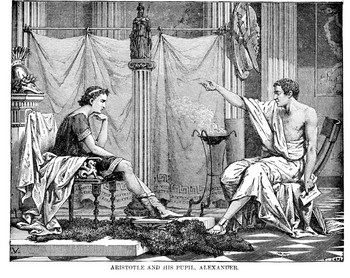 Alasdair MacIntyre has pointed out that the barbarians are no longer vying for the seat of power, they “have already been governing us for quite some time.” With this historical fact taken for granted, it will be profitable to elaborate on the meaning of what Rod Dreher (in the spirit of MacIntyre) has coined the “Benedict Option,” correct a few misconceptions surrounding this option, and then end with a defense for its necessity. The purpose of the Benedict Option is twofold and can be summed up by the words of St. Paul to the Thessalonians when he exhorts them to strive for holiness: "For this is the will of God, your sanctification: that you abstain from immorality; that each one of you know how to control his own body in holiness and honor, not in the passion of lust like heathen who do not know God; …For God has not called us for uncleanness, but in holiness. Therefore whoever disregards this, disregards not man but God, who gives his Holy Spirit to you…But we exhort you brethren…to aspire to live quietly, to mind your own affairs, and to work with your hands, as we charged you; so that you may command the respect of outsiders, and be dependent on nobody" (1 Thess 4:3-12) While this succinctly describes the purpose of the Benedict Option—to put God first without “disregard” and to obtain holiness—it does not make clear how one ought to proceed from here; although it does leave hints, one of which is found in the last part of the verse. When St. Paul tells us to “work quietly, to mind your own affairs, and to work with your hands” he is giving us an idea as to how we ought to go about accomplishing the previous exhortation to “abstain from immorality” and to control our “own body in holiness and honor.” If working quietly and with our hands is the way to do this, then we can conclude at least one thing about the Benedict Option: there will have to be some distance between us and the noise of the world.[1] Without this distance, the quiet that we ought to seek cannot be had.[2] This necessary distance has both a literal and metaphorical sense: First, distance must include a literal geographical distance (one cannot escape the smoke of a burning house unless one physically leaves the premises). Second, the distance we seek will have to be one that allows us to be independent of the modern ethos (i.e., “be dependent on nobody”). The former can be obtained by our own hands. The latter will demand a reorientation of the whole person, which can only be attained by right worship. And this of course is the ultimate end of the Benedict Option—to first glorify God in worship, and secondly, to obtain holiness in so doing. While this option is a movement away from the ethos of modern culture and toward a deeper worship of God, it does not mean that we must all drop completely out of society, move to the desert, and let our political structures remain in the hands of the Church’s enemies without a fight. The Benedict Option is not the logical conclusion to the religion of Timothy Leary; it is not a “dropping out;” it is a means to spiritual integrity and the worship of God. While the option is not a total seclusion, it does however hold that in a society so corrupt and ungrounded in any kind of transcendent moral system (apart from unbridled individualism), one must place oneself at a distance. In an atmosphere where the icons are half naked Disney princesses, the “leaders” are all but professed enemies of the traditional teachings of Christ and His Church (a profession would make things a lot easier), and Catholic education has fallen into the tyranny of entertainment,[3] there must be some kind of separation.  Alexander and Aristotle, his tutor Alexander and Aristotle, his tutor Aristotle, in his Rhetoric, makes the point that pleasure is “a movement by which the soul as a whole is consciously brought into its normal state of being.” (Bk. I, ch. 11) The soul finds pleasant whatever leads it back to its normal state, which is a kind of rest from toil. Thus, Aristotle lays down the following rule: It must be pleasant to move towards a natural state of being. This makes good sense and explains much of our common experience, like the fact that food is always more delicious to the more hungry man. The more drastically we move to a state of natural rest and away from the opposite, the more pleasant is that movement. This situation is complicated, however, by another bit of common experience. We often take great pleasure in things that are harmful to us objectively in that they do violence to our nature and destroy or severely impair our natural faculties. Think, for example, of an addict. For a soul in this state, it is very clear that a move back toward its natural state is painful rather than pleasant. Some might at this point simply abandon Aristotle’s insight. This move would be premature. For Aristotle himself provides the key to understanding the above situation: “Habits also are pleasant; for as a thing has become habitual, it is virtually natural.” (ibid) We are used to calling habits “second nature.” When a person is habituated to a certain action, then to act in accord with the habit is akin to acting in accord with his nature. If a habit is itself contrary to nature, then it will be the case that acting in accord with nature is painful. But how are such habits developed? Typically, habits develop from repeated action. Actions themselves are carried out with motives, among which is found pleasure. Man, as an animal, finds himself equipped with a sensible appetite that takes pleasure in the possession of all the goods of his survival, preservation, propagation, and assertion. As a rational animal, it falls to his faculty of reason, rather than instinct, to moderate these desires. When man acts upon these appetites for sensual pleasures without the voluntary moderation of reason, he develops habits which are un-ruled by reason; that is, habits of acting against his own rational nature. |
AuthorsThe authors of this blog are the tutors of Saint John of the Cross Academy: Archives
November 2016
Categories
All
|
 RSS Feed
RSS Feed